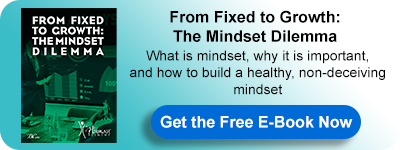Mindset: The Different Types
There are two primary types of mindsets, according to Carol Dweck, who is Lewis and Virginia Eaton Professor of Psychology at Stanford University and one of the world’s leading researchers on motivation and mindsets: fixed and growth. You feel your abilities are fixed traits that can’t be modified if you have a fixed attitude. You may also assume that success is determined solely by your talent and intelligence and that no effort is required.
On the other hand, if you have a growth mindset, you can develop your qualities and abilities over time with effort and perseverance. This mindset does not necessarily believe that everybody can become Einstein or Mozart simply by trying. They do, however, believe that with effort, anyone may become more intelligent or more gifted.
What is the Main Difference Between Fixed and Growth Mindsets?
The primary difference between the two mindsets is how they regard intellect and ability: one sees it as very permanent, with little to no space for progress in any way, while the other sees it as more malleable, with potential for improvement in both directions (or, for that matter, regression). This attitude gap could lead to significant behavioral changes. If someone feels that intelligence and abilities are unchangeable, they are unlikely to make substantial efforts to improve their innate intelligence and abilities. On the other hand, those who believe they can modify these characteristics may be far more prepared to put in extra time and effort to reach more ambitious goals.
Individuals with a growth mindset may achieve more than others because they are less concerned with seeming clever or gifted and instead focus their efforts on learning (Dweck, 2016).
However, there are some misconceptions around “growth mindset”:
1. "I already have it, and I always have"
People frequently conflate a growth mindset with attributes such as flexibility, openness, and optimism, which they assume they’ve always possessed. It is what my colleagues and I refer to as a “false growth mindset.” Everyone has a combination of fixed and growth mindsets, which change over time as they gain experience. There is no such thing as a “pure” growth mindset, which we must acknowledge to reap the benefits we seek.
2. A growth mindset is just about praising and rewarding effort
This is not the case for students in schools, nor is it the case for business employees. In both cases, the outcome is crucial. It’s never a good idea to put out the unproductive effort. It’s vital to recognize effort, learning, and growth and the methods that lead to these outcomes, such as requesting aid from others, trying new strategies, and effectively capitalizing on setbacks. The bottom line in all of our studies is the result of profoundly engaging in these processes.
3. Just espouse a growth mindset, and good things will happen
Adopting a growth mindset is a great start that can lead to positive results, but it’s not a guarantee; the mentality must be accompanied by the effort put into desirable activities, and even then, success is not guaranteed.
1Harvard Business Review, 13 Jan 2016, Carol Dweck, What Having a Growth Mindset Actually Means?, Accessed 14 Oct 2021, https://hbr.org/2016/01/what-having-a-growth-mindset-actually-means
Positive Psychology, 31 May 2021, Courtney E. Ackerman, MA, Growth Mindset Vs. Fixed Mindset Key Takeaways from Dweck’s Book, Accessed 14 Oct 2021, https://positivepsychology.com/growth-mindset-vs-fixed-mindset/
Very Well Mind, 29 April, 2021, Kendra Cherry, What is a Mindset and Why it Matters?, Accessed 14 Oct 2021, https://www.verywellmind.com/what-is-a-mindset-2795025
For more about this topic, download our latest book " From Fixed To Growth: The Mindset Dilemma " for FREE:
